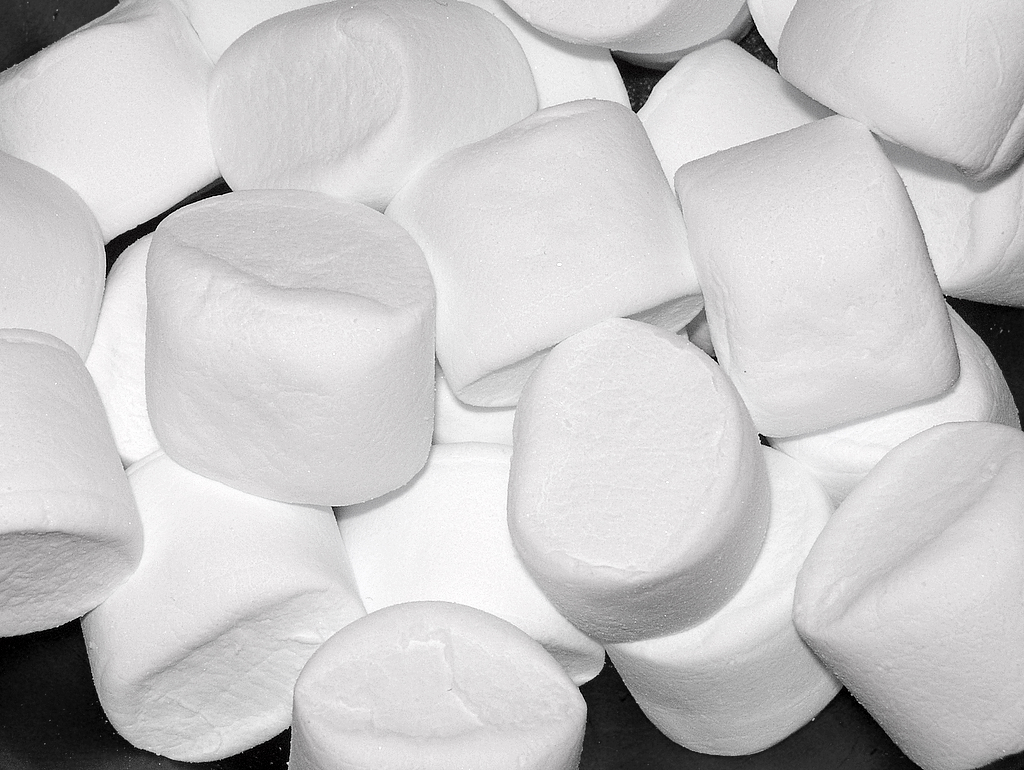What, you may ask, does a marshmallow have to do with parenting?
Well, it’s mighty tasty melted with milk chocolate between two graham crackers over an open fire. And certainly, many a fond parent-child memory has been created in the back yard or campground making s’mores and telling spooky stories. But that’s not where I’m going with this.
You might be raising an eyebrow just now and wondering, is Andy actually getting philosophical over marshmallows? Is this a lesson in resiliency, likening the pillowy marshmallow to the ability to bounce back when life gives you the squeeze?
That would be pretty clever. And it’s true, resiliency is a great quality in children and adults. But that’s not where I’m going, either.
As you probably already know, my wife Polly and I are the proud parents of two boys, and we’ve received some wonderful compliments on their behavior and character. It’s nice to hear, but trust me – I wasn’t born a parenting genius. Far from it! What I am, though, is a curious guy with a lot of love for my family. So I’ve paid attention, read a lot, and given parenting some serious thought – all because I believe it’s the most important role in my life.
Along the way while keeping my eyes and ears open, I learned about some experiments that were done at Stanford in the 1960s, known as The Marshmallow Event. Here’s what happened: they gave four- and five-year-old kids a single marshmallow each, along with the promise that if they could wait to eat it until the researcher got back in fifteen minutes, they would get a second marshmallow.
In exchange for a little patience, these kids could double their prize.
What do you think happened?
Well, we’re talking about kindergarten age kids here. So yes, most of them ate up that marshmallow in a hurry. But there were a few who managed to wait and got rewarded with a second marshmallow.
Years later, when these kids were adults, the professor behind The Marshmallow Event did a little follow-up. And what did he find? Listen to this. The ones who all those years ago had kept temptation at bay in the face of a plump, sweet treat had higher test scores, better career paths, and overall higher levels of achievement.
So as parents, what can we take from The Marshmallow Experiment to make a positive impact through our day-to-day interactions with our kids?
The ones who waited and got the extra marshmallow had a head start on all the others. Somehow, at the tender age of four or five, they’d learned a skill that all successful people eventually master: the ability to extend their view of time and connect it to their present actions and decisions.
In fact, there’s a phrase I use with my boys along the same lines: “Today’s actions create tomorrow’s results.”
When it comes to raising children, many of us struggle with our own ability to extend our view of time. We may not think more than a week or two ahead, so it’s no easy feat instilling that expanded awareness in our kids.
In fact, some of us may feel that a happy childhood is in some ways defined by a blissful ignorance of the future.
Now I’m not here to rush anybody through the carefree days of childhood, but there is something to be said for nurturing that expanded view of time if you’re going to raise successful adults. After all, a happy childhood won’t mean much if that child becomes a lost, dysfunctional, unhappy adult.
You know, years after The Marshmallow Event, some researchers at Rochester University decided to replicate the Stanford experiment, but with some variations. For example, some kids were given a small box of crayons, and were told that a bigger box was coming. But they never got it.
Another group had a more reliable experience. They were given what they’d been promised.
So when researchers rolled out the marshmallows, the kids who’d had the unreliable experience with the crayons had no reason to believe the researchers would stick to their word, so they gobbled up the first marshmallow, figuring, hey, there’s no second marshmallow coming. I’d better eat what’s in front of me because it’s probably all I’m getting.
And, surprise! The kids whose first experience was reliable – that is, they got what they were promised — showed more patience in waiting for the second marshmallow.
This points to one simple thing we parents can start doing immediately to help our great kids become great adults.
We can keep our promises.
Instill in your kid a sense of reliability. Every kept promise from Mom and Dad is quietly – but powerfully – building his or her future orientation. You’re creating the difference that mattered for those four- and five-year-olds who, back in the ‘60s, waited patiently to double their marshmallows. The same kids who grew up to be happier, more successful adults.
Now I have a promise for you and you can bet I’m going to keep it.
If you enjoyed this little marshmallow lesson, then you’re really going to enjoy the 4-part video series I’ve put together about other uncommon parenting knowledge. I promise to give you free access to these videos.
I want you to watch them because of the huge impact they’ve had on thousands of other parents. Your short time investment in these videos could pay off in the lives of your children forever.
Click here for free instant access to the video series.
I’ve been studying experiments like the marshmallow test for quite some time. And I’ve boiled down my most important findings into these 4 short videos. This is must-know information for every single parent on this planet.
But I’ll tell you more once you get in there. See you on the inside!









